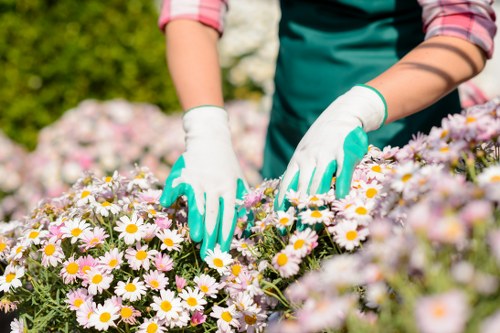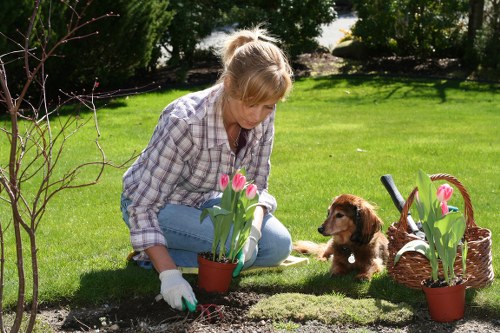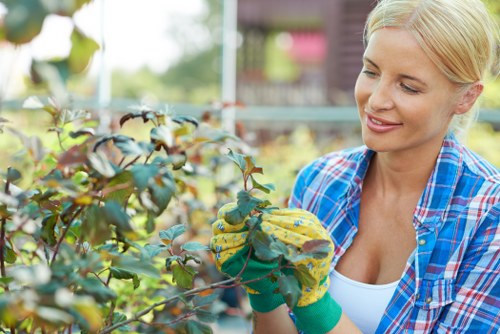Garden Maintenance Mill Hill

Welcome to our comprehensive guide on Garden Maintenance Mill Hill. Gardening in Mill Hill is an enriching experience due to the area's unique blend of urban charm and natural beauty. In this article, we'll discuss why garden care is so important and how you can achieve a neat, sustainable, and flourishing garden that fits the local environment.
When investing time into garden maintenance, you create a peaceful sanctuary for yourself and enhance the beauty of Mill Hill. Our tips and advice are designed to help both beginners and seasoned gardeners ensure that their outdoor spaces remain attractive and healthy all year round.
Understanding the local climate and soil conditions is crucial for nurturing your garden. Garden maintenance here is not only about aesthetics but also about sustainability, biodiversity, and creating habitats that support local wildlife.

Why Garden Maintenance Matters in Mill Hill
Mill Hill residents take pride in lush and vibrant gardens, which often serve as extensions of their living spaces. A well-kept garden can improve your home's curb appeal, add value to your property, and provide personal satisfaction.The Role of Landscape Design and Regular Upkeep
Regular garden maintenance involves seasonal care, pruning, weeding, and occasional landscaping redesigns. Every garden is unique; however, common practices include soil nutrition management, pest control, and irrigation care. Utilizing eco-friendly techniques is a growing trend among local gardeners.For those who need a little extra help, professional garden maintenance services in Mill Hill are available. They offer a range of services from seasonal clean-ups to year-round garden care, ensuring your garden remains a true gem!

Seasonal Garden Maintenance Tips
Gardening tasks change with the seasons. In spring, focus on planting new flowers, refreshing mulch, and preparing vegetables for growth. It's also the perfect time to fertilize your garden to give your plants the best start.During the summer months, water management becomes essential. Make sure your garden gets enough water without over-saturating the soil. Mulching and using drip-irrigation systems can help keep your landscape hydrated while conserving water.
As autumn arrives, your garden needs less water but more attention to leaf removal and seasonal pruning. Winter preparation is also key: clean up fallen debris and protect tender plants from frost damage by using covers or cloches.

Sustainable and Eco-Friendly Gardening Practices
In Mill Hill, many gardeners are turning to sustainable methods. Organic fertilizers and natural pest control methods reduce chemical runoff and protect the environment. Using compost and mulching not only enriches your soil but also helps in reducing landfill waste.Adopting Natural Techniques
This approach is essential because it benefits the local ecosystem. Encouraging native plant species and using rainwater harvesting systems are among the techniques that promote a greener garden. These initiatives can foster biodiversity, supporting bees, butterflies, and other beneficial insects.Consider planting a mix of perennials and annuals. This diversified approach can improve soil structure and reduce water consumption. Sometimes, a small change like swapping chemical fertilizers for organic compost makes a big difference.

The Benefits of Professional Garden Services
While many enjoy DIY garden care, hiring professional garden maintenance services in Mill Hill can make a remarkable difference. Professionals bring expertise, efficient equipment, and a structured plan to revitalise your garden.Why Hire Professionals?
Professionals have the right tools and training to address issues like invasive weeds, pest infestations, and seasonal pruning. They also provide tailored advice for your garden's specific needs.Cost-Efficiency and Long-Term Value
Although hiring experts might seem expensive, remember that a well-maintained garden saves you money in the long run by preventing costly damages and enhancing property value. Often, a small investment in professional services turns into a larger return through improved garden health.Local Relevance: Understanding the Mill Hill Environment
Mill Hill is surrounded by a rich blend of suburban and urban landscapes. The weather can vary greatly between seasons, making it necessary for local gardeners to adapt their techniques accordingly. With properly maintained gardens, the natural beauty of Mill Hill is enhanced and becomes a community asset.The balance between manicured lawns and wildflower patches is a fine art. Residents learn to appreciate the local flora, and maintenance routines are adjusted to respect both aesthetics and nature. Understanding factors like wind exposure, sunlight, and rainfall is key to effective garden care.
Local garden experts advise that regular inspections help catch issues before they become major problems. Whether it's checking for signs of disease, pest infestations, or the early onset of soil erosion, every detail matters in ensuring a thriving garden.
Nearby Areas and Their Unique Garden Characteristics
Garden care in Mill Hill is influenced by the neighbouring areas, each of which has distinct garden styles and local flora. Here, we discuss the 10-15 closest areas to Mill Hill along with their unique features:- Golders Green – Known for its classic, well-tended gardens and a rich cultural heritage, Golders Green offers leafy streets and charming outdoor spaces.
- Hendon – With a mix of residential and commercial areas, Hendon demonstrates diverse gardening techniques due to varying urban influences.
- Cricklewood – This bustling area exhibits modern and traditional garden designs, reflecting its historical evolution.
- Edgware – Home to expansive green spaces and community gardens, Edgware highlights the importance of communal care and shared spaces.
- Brent Cross – While known for its shopping center, Brent Cross also boasts innovative urban gardens and green rooftops.
- Finchley – In Finchley, small gardens flourish with a variety of native plants, demonstrating eco-friendly gardening practices.
- Hampstead – Famous for its artistic community and historic homes, Hampstead gardens often display a blend of traditional charm and avant-garde design.
- Kilburn – This area mixes modern urban life with green spaces designed to reduce the urban heat island effect through sustainable landscaping.
- Stanmore – Stanmore features historical estates with precisely manicured gardens that reflect an era of traditional gardening techniques.
- Burnt Oak – Known for its vibrant community and local gardening projects, Burnt Oak is an example of urban renewal through green initiatives.
- Colindale – With rapid urban development, Colindale still finds time to cultivate community gardens focused on native species and organic care.
- Kingsbury – This suburban area stands out with its spacious gardens and emphasis on sustainable water practices and floral diversity.
- West Hendon – West Hendon boasts innovative community-led garden projects that emphasize green living and outdoor space utilization.
- Childs Hill – Nestled among residential streets, Childs Hill gardens are known for their quaint, personalized touches and friendly neighborhood appeal.
Each of these areas influences the gardening techniques used in Mill Hill, providing diverse inspiration for maintaining practical yet attractive gardens.
Essential Equipment and Safety Tips for Gardeners
A well-equipped gardener is a happy gardener. Investing in quality tools such as spades, pruners, and watering systems is essential for any garden maintenance routine. Using the right tools not only makes the work easier but also ensures safety during outdoor tasks.Safety First: When working in your garden, always wear gloves and protective eyewear. Be sure to handle sharp tools with care and follow instructions on any equipment used. This minimizes the risk of injury while performing diverse garden tasks.
Many garden maintenance services in Mill Hill also offer safety consultations and can advise on best practices. Whether you're a beginner or an experienced gardener, updating your knowledge about safety guidelines is crucial.
Improving Your Garden's Longevity Through Maintenance
Long-term garden health is built on consistent care and attention. From improved soil fertility with natural compost to regular pruning and pest management, every small task you perform contributes to your garden’s overall well-being.Regular maintenance prevents problems such as root rot and infestations before they escalate. Early detection means you can handle challenges promptly, reducing the risk of extensive damage. Additionally, seasonal planning ensures that each component of your garden receives the proper care at the right time.
Implementing a maintenance schedule, perhaps with an annual calendar of tasks, can help you stay on track. Consider scheduling monthly or even weekly check-ups to observe the growth, health, and appearance of your garden.
Tips for Personalizing Your Garden
Every garden tells a story about its owner. To create an engaging and personalized outdoor space in Mill Hill, consider combining different garden styles, colors, and textures. Using a mix of ornamental grasses, flowering shrubs, and vegetable beds offers both visual interest and functionality.Enhance your garden by incorporating elements that reflect your personality. Consider adding a quaint seating area, a decorative water feature, or even a small vegetable patch. These touches can make your garden a true extension of your home.
Personalizing a garden also means using native plants and seasonal blooms that adapt well to the Mill Hill environment. This not only reduces maintenance efforts but also ensures that your garden remains in harmony with nature.
Expert Tips on Maintaining a Healthy Garden in Mill Hill
Here are several expert tips to help you maintain an immaculate garden throughout the year:- Plan Ahead: Before each season, assess your garden's needs. Evaluate the soil, decide on new plantings, and prepare for seasonal changes.
- Regular Pruning: Trim your plants to promote healthy growth and remove any dead material. This practice enhances appearance and discourages pest infestations.
- Watering Wisely: Invest in a quality watering system, like drip irrigation, to ensure that each plant receives the right amount of moisture.
- Nutrient Management: Regularly add organic compost or natural fertilizers to the soil to keep it rich and full of life.
- Eco-Friendly Methods: Choose natural pesticides and organic fertilizers to avoid harming local wildlife and to promote biodiversity.
Bonus Tip: Always keep an eye on local weather forecasts to adjust your garden care routine. This will help you prepare for unexpected weather changes and protect your plants accordingly.
By following these expert guidelines, you can develop a garden care strategy that is both efficient and susceptible to the seasonal rhythms of Mill Hill.
Maintaining Garden Tools and Equipment
A garden is only as good as the tools available to maintain it. Investing in high-quality equipment is one step toward creating a sustainable outdoor space. Regular cleaning, sharpening, and proper storage of garden tools will extend their lifespan and improve garden efficiency.Many gardeners find that sharing tools or renting equipment for larger projects is a great way to manage expenses while ensuring that only the best tools are used on the job. Remember to read the instructions and follow safety guidelines for maintaining these tools.
Also, investing in a proper storage shed or toolbox dedicated to your garden supplies will keep your equipment organized and in optimal condition, making your gardening activities smoother and more enjoyable.
Embracing Community and Sharing Garden Maintenance Tips
Mill Hill is known not only for its beautiful gardens but also for its strong community spirit. Often, gardeners in Mill Hill share ideas, tips, and even some tools, creating an open and collaborative environment that benefits everyone.Garden clubs and local workshops are a great way to learn new techniques and exchange experiences. Sharing a passion for nature unites people and allows gardeners to adapt successful practices from neighbors.
Community engagement can lead to joint projects like community gardens, which provide vibrant green spaces in urban areas and promote environmental stewardship.
Frequently Asked Questions about Garden Maintenance in Mill Hill
What are the best seasonal tips for maintaining my garden?
Answer: Each season requires specific care. In spring, focus on planting and fertilizing; in summer, manage water carefully; in autumn, prune and remove fallen leaves; and in winter, protect sensitive plants from frost. Tailoring your activities to each season helps your garden thrive.
How can I practice eco-friendly gardening?
Answer: Use organic fertilizers, compost natural waste, and opt for natural pest control methods. Embrace native plant varieties that require less maintenance and water to promote sustainability and biodiversity.
Is hiring a professional garden maintenance service in Mill Hill worth the expense?
Answer: Often, yes. Professional services bring expertise, specialized tools, and well-planned maintenance routines which can really enhance the beauty and longevity of your garden. They help prevent problems that could lead to costly repairs in the future.
What equipment do I absolutely need for basic garden maintenance?
Answer: Essential tools include quality pruning shears, spades, watering equipment, and a reliable pair of gloves. Over time, you might invest in additional equipment like a drip irrigation system or a garden tiller for larger spaces.
How do nearby areas influence garden maintenance practices?
Answer: The neighboring areas such as Golders Green and Hendon have their own gardening styles and microclimates. Insights from these communities often influence local techniques, from irrigation practices to plant selections, making garden maintenance in Mill Hill a collaborative and evolving process.

